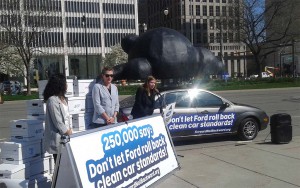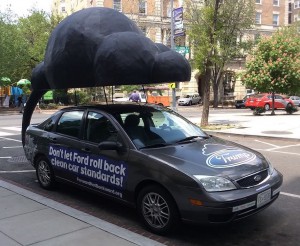
Greenpeace, The Sierra Club and Public Citizen dropped a petition with 250,000 signatures at Ford headquarters in Dearborn, Michigan.
With the battle over U.S. fuel-economy rules growing more intense, environmental groups have targeted Ford Motor Co. for special treatment as they presented the company with petitions bearing 250,00 signatures calling on the automaker to drop its support for altering the current fuel-economy and emission standards.
Madeline Page of the Public Citizen, which helped organize the online petition drive, said Ford was singled out because of the “hypocrisy” of its position. She noted the company pushes a green message in its advertising and its executive chairman, William Clay Ford Jr., warns about the need for safeguarding the environment but conversely its vehicles are consistently among the least fuel efficient, according to a trend report compiled by the Environmental Protection Agency.
The “Dirty Ford” campaign, organized by Greenpeace, Public Citizen and the Sierra Club, parked an old Ford Focus with big black cloud hanging over it at several spots around Detroit, including a new Ford technical center dedicated to autonomous vehicles in Detroit’s gentrifying Corktown neighborhood before dropping the petitions at the security desk in Ford headquarters.
Ford representatives appeared to be sensitive to the efforts by the environmental groups to target the Dearborn, Michigan-based company despite the fact that other automakers are in favor of rolling back the CAFE standards.
(Ford shuts down half of F-150 production due to supplier fire. Click Here for the story.)

Public Citizen, Greenpeace and The Sierra Club protested Ford's role in CAFE decisions by using this Ford Focus.
Ford spokeswoman Christin Baker said in response to the petition from the environmental groups both William Clay Ford Jr. and CEO Jim Hackett recently outlined the company’s position, which appears to have shifted from former CEO’s claim back in 2017 that the Obama standards would eliminate 1 million jobs in the U.S.
“We support increasing clean car standards through 2025 and are not asking for a rollback. We want one set of standards nationally, along with additional flexibility to help us provide more affordable options for our customers. We believe that working together with EPA, NHTSA and California, we can deliver on this standard. In addition, at Ford, we believe we must deliver on carbon dioxide reductions consistent with the Paris Climate Accord.
“We already have charted a course for our future that includes investing $11 billion to put 40 hybrid and fully electric vehicle models on the road by 2022 as well as responsible development of the self-driving car,” Ford and Hackett noted in a comment on Medium.com.
The statement is a move away from the posture from previous CEO Mark Fields, who was in favor of lowering the requirements.
However, Ford’s call for a “national standard,” which is echoed by GM CEO Mary Barra, appears to lean towards the Trump administration position that California should not have a say in setting Clean Air Standards and is opposed by environmental groups.
(Click Here for more about Ford developing tech allowing the blind to “Feel the View.”)
“They’re all equally bad, but Ford seems the most hypocritical,” Page said, speaking of Detroit’s other manufacturers, General Motors and Fiat Chrysler Automobiles N.V. support for the rollback of fuel economy standards under consideration by Trump administration, which reviewing that standards imposed on the industry at the very end of the Obama administration in January 2017.
All three companies have a long history of delaying the adoption of innovations, from seat belts and airbags to tighter emission controls, that would improve the safety and health of citizens as standard equipment, Page said.
The CAFE rules now in force require carmakers to reach a corporate average fuel economy of 54.5 miles per gallon by 2025 and require a significant reduction in the emission of greenhouse gasses, which are linked to climate change.
“From climate change to higher gas bills the ‘Dirty Ford’ illustrates just some of the harm that Ford, Trump and ‘Polluting Pruitt’s’ deregulation would impose on Americans,” Page said.
Gail Philbin, director of the Sierra Club’s Michigan Chapter, said Ford is important to Michigan economy and should look to its long history of innovation for guidance instead of fighting regulations that are necessary to protect the environment.
“We’re going to every Ford hot spot around town,” said Natalie Nava of Greenpeace. “We’ve been calling on them to support the standards. We want a strong unequivocal statement.”
(To see more about Ford’s potential interest in the abandoned Detroit train station, Click Here.)
Ford, which also has been criticized for its recent decision to cut production of passenger cars in favor less efficient trucks and sport-utility vehicles, said it favors modifying not scrapping the existing fuel economy standards. It also favors one “national standard” that would basically eliminate the state of California’s ability to regulate automobile emissions in that state.


Nothing stopping Ford from announcing they will double or triple the current CAFE standards.